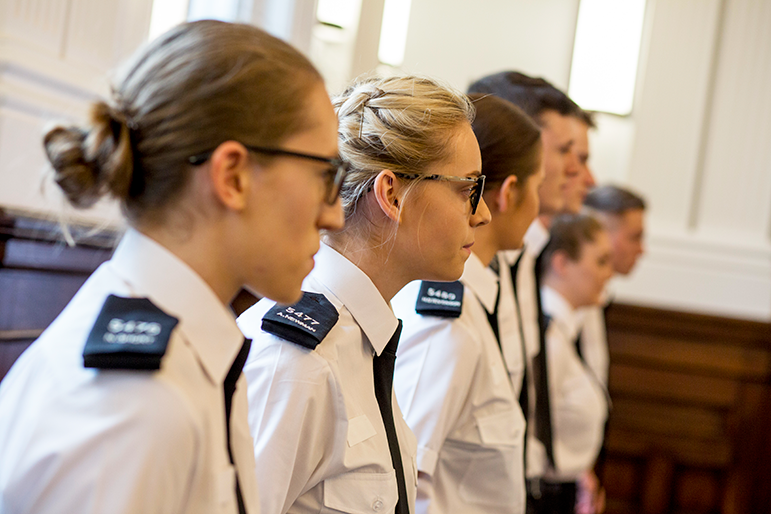Criminology and Policing BA (Hons)
UCAS code: L331
About this course
This new course will be open for applications very soon. In the meantime, you may wish to book a place at one of our upcoming Open Days to find out more.
You can also contact the Course Leader with any questions at jennifer.golding@ntu.ac.uk.
Enter a world of crime, offenders, victims and the criminal justice system. This degree truly combines theory and knowledge with the world of practice as you explore the complex issues of law enforcement and police procedure, alongside ethics and crime analysis.
You'll explore the 'crime experience' from the perspective of the victims and perpetrators; what motivates people to commit crime and how society responds to it; and how crimes are solved through modern policing investigative techniques.
You'll be guided through your journey with us by our teaching team who have a crucial mix of experienced criminologists, and career law-enforcement professionals, who between them have decades of experience on the beat and working to shape the criminal justice system.
What you’ll study
This course provides unique insights into crime and policing by combining the 'academic' with real world policing practice. You'll have the opportunity to learn about the role of digital media investigators (DMIs), and the investigation and impact of digital crime. You'll explore how technology is both utilised by criminals, and is a key weapon for fighting crime for crime fighting agencies.
Within your practical modules, you'll also learn more about crime scene investigators (CSIs), and visit the Crime Scene House at our Clifton Campus to learn more about crime scene analysis and how to forensically recover evidence.
All of our modules will contribute to your overall experience that means you'll be well-prepared to enter an exciting and fulfilling career, whether that be shaping the future of policy and the criminal justice sector, patrolling the streets, or working with offenders and victims of crime.
Here’s a full breakdown of the modules you’ll be studying throughout the course.
Core modules
The Criminal Justice Process (20 credits)
In this module, you’ll be introduced to the systems, processes and agencies that have evolved to deliver justice to offenders, victims and wider society. You’ll consider how competing philosophies and models of justice have helped to shape the modern Criminal Justice System in England and Wales (and beyond), whilst applying your knowledge to real world practice through case-studies, probation reviews, court visits and practitioner insights.
Problem Solving and Decision Making (20 credits)
This module provides students with an introduction to problem solving and decision-making techniques and models as utilised within the police service to make effective decisions at police incidents, and to implement effective evidence-based crime reduction techniques and strategies.
Conversations in Criminology (20 credits)
This module introduces you to a range of contemporary conversations and debates occurring within the wider criminology canon. In doing so, it equips you with the core study skills needed to succeed throughout the rest of their journey with us.
Police Powers 1 (20 credits)
During this module you'll begin to develop your portfolio of practical work experiences while under the tutorship of Nottinghamshire Police. You'll also develop a foundation of legal knowledge and IT packages such as 'Niche' and 'NCALT'.
The Criminal Justice System and Crime Investigations 1 (40 credits)
You will gain an understanding of the structure and operation of the UK criminal justice system and the role of the police within it. You will also get an introduction to crime investigation techniques such as statement taking for victim and witnesses, evidence gathering at crime scenes the and subsequent management of evidence. The module also includes an introduction to investigative interviewing techniques for suspects utilising police models.
Core modules
Public Protection (20 credits)
You'll gain a critical evaluation of the theme of public protection, concentrating on specific areas of legislation. The module will cover areas such as domestic violence, the management of sexual and violent offenders, vulnerable victims, safeguarding of adults and children and the police approach.
Crime Reduction and Community Safety (20 credits)
Through exploring the nature, history and social context of crime prevention, you’ll evaluate the different approaches and models that have been developed to reduce crime and promote community safety.
Explaining Crime (20 credits)
By assessing the merits of competing theories relevant to crime, victimisation and responses to crime together with the role of criminology in society, you’ll explore the developments in criminological thought through the lens of disciplines such as sociology, psychology and criminology.
Crime Investigations 2 (20 credits)
This module provides students with additional development from Crime Investigation 1 and further seeks to develop knowledge and understanding of crime investigation techniques, crime scene management, forensic awareness.
Optional modules (choose one)
Evidence-Based Police Intelligence and Community Policing (40 credits)
This module provides you with an introduction to the concepts of Evidence Based Practice (EBP). You will assess the interaction with community policing, particularly methods of engagement and decision making. Finally, to link both EBP and community policing into the handling and processing of police information and intelligence.
Applied Criminology (40 credits)
Using action research, you will work with practitioners, academics and community members to explore potential solutions to ‘real world’ live projects. Through the process of reflective practice, this module seeks to better understand how we might align the ‘doing’ of criminology with concepts such as active citizenship, identity, human rights and ultimately, ‘justice’. This module includes 60 hours of Assessed Work-Like Experience.
In your third year, you have the option to undertake a year-long work placement. If you decide that you wish to do this, you can arrange this via your course team once you are studying with us. You would then return to complete your final year of studies in Year Four.
Core modules
Future Directions in Criminology (20 credits)
By exploring prevalent and emergent crime types, you’ll develop a critical understanding of how the implementation and evaluation of policy responses to crime and wider social problems translate for practitioners, service users and those researching within this context. You’ll also be asked to critically evaluate the alignment between social and criminal justice, and the role that critical criminology plays in this.
Dissertation / Research Project (40 credits)
Utilising the skills that you have developed as a researcher, you will have the opportunity to undertake a substantial piece of self-directed work in an area of criminology that interests you – further building on your employability skill set. Your Research Project can be entirely theoretical or draw upon empirical work (including working with a local organisation).
Optional modules (choose one from each set)
Set 1
Media and Crime (20 credits)
This module will help you develop a critical understanding of theories that shape the connections between criminology and media studies and discover distinct approaches and representations of crime by mass and new media. You’ll explore current issues faced by the media, such as discussions about fake news and how the media approach criminal and antisocial behaviours.
Digital Policing and Counter Terrorism (20 credits)
You'll critically develop your understanding of digital policing concepts and counter terrorism issues. In this module you will learn specifically how to manipulate digital devices and extract evidence for a policing purpose.
Set 2
Drugs, Crime and Justice (20 credits)
On this module you will critically assess the local, national and international significance, prevalence and nature of drug use, misuse and harm. You will explore the complexities and impacts of drugs on society and gain a critical understanding of the political, legislative and criminal justice responses to drug-related activity in England and Wales.
Young People, Crime and Justice (20 credits)
On this module you will critically assess the local, national and international significance, prevalence and nature of drug use, misuse and harm. You will explore the complexities and impacts of drugs on society and gain a critical understanding of the political, legislative and criminal justice responses to drug-related activity in England and Wales.
Set 3
Serious and Organised Crime (20 credits)
Look back at the development, typologies and evolution of ‘Organised Crime Groups’ over time and build an understanding of the UK’s Organised Crime issues and how they are seated in an international context. You’ll explore the complexities of involvement in and impacts of serious and organised crime, as well as the impact developing technologies have on this issue.
Cybercrime (20 credits)
Develop an understanding of theoretical debates surrounding contemporary cyber threats across the globe. You’ll demonstrate a critical appreciation of the complexities of involvement in, and impacts of, Cybercrime and its threats to victims and analyse the effectiveness of responses from criminal justice systems, police forces and the state.
We regularly review and update our course content based on student and employer feedback, ensuring that all of our courses remain current and relevant. This may result in changes to module content or module availability in future years.
How you're taught
You’ll learn from a teaching team with almost a century’s experience in the field — former consultants and courtroom professionals, police and probation officers, and senior civil servants. These experts have come from all around the world to explain the applied practice of criminology in countries like Brazil, Trinidad, Australia, Egypt, Denmark, and Greece — and of course, the UK.
You’ll be learning through a mix of:
- lectures
- small-group seminars and workshops, designed to improve your debating, teamworking, and problem-solving skills
- one-on-one meetings with your friendly personal tutor
- independent study, as you build up your research skills
- authentic work-like experiences, including a real-world prison placement (if your application is successful)
How you're assessed
- Year One — coursework and written
- Year Two — coursework, written and practical
- Year Three — coursework, written and practical
Contact hours
You will ordinarily have around 10-12 hours per week of contact time (such as lectures, seminars and workshops) in the first and second year and around 8-10 hours in your final year. This is around 25%-30% of a full-time week and approximately 90% of our teaching is in-person. The remaining 70%-75% of your time should be devoted to directed learning and independent study.
- Year One — lectures / seminars / workshops, independent study
- Year Two — lectures / seminars / workshops, independent study and placement
- Year Three — lectures / seminars / workshops, independent study
Careers and employability
This course is all about preparing you for an exciting future career, and by combining elements of the traditional criminology and professional policing degrees, you'll develop a range of skills that make you attractive to future employers.
You'll develop a comprehensive understanding of the foundations of criminology and the cause and effect of crime, alongside the practical aspects of policing. You'll be able to critically think and analyse with specialist knowledge of police procedure, ethics and crime, and understand how this applies to law enforcement in world today and how it impacts on factors such as the relationship between agencies such as the police and justice agencies and the communities they serve.
Crucially, we want to support you to become adaptable and thoughtful leaders and communicators that are able to solve problems, work effectively as part of diverse teams, and understand what it means to influence the world around you.
Recently, our Criminology and Professional Policing graduates have found work as:
- Police and probation officers
- Civil servants in the Home Office and Ministry of Justice
- UN caseworkers
- Intelligence analysts
- Advisors for domestic violence projects.
Throughout your course, you'll be able to access the support of our in-house Employability team.
Campus and facilities
You’ll mainly be studying in the Chaucer and Newton buildings, at the centre of our vibrant City Campus. As well as a range of classrooms and lecture theatres, the facilities including a mock prison cell, banks of open-access PCs, social spaces for either quiet study or busy group work. As part of your studies you'll also have the chance to visit our Crime Scene House at the Clifton Campus.
NTU’s City Campus has everything you’ll need to stay busy between lectures. As well as the Boots Library and its beautiful roof garden, there’s our stylish Students’ Union building and two-storey, 100-station gym; a whole host of cafés, bars, restaurants and food outlets for every taste; our much-loved Global Lounge; performance and rehearsal spaces for musicians; and much, much more!
Take a few steps off campus and you’ll find yourself in the heart of Nottingham — one of Britain’s top 10 student cities, and one of Europe’s top 25. It’s stuffed with history, culture, and well-kept secrets to discover at your leisure. Enjoy lush green spaces, galleries, hidden cinemas and vintage shopping by day, and an acclaimed food, drink and social scene by night.
Take our virtual tour to get a real feel for the campus.
Entry requirements
UK students
Standard offer: 112 UCAS Tariff points from up to four qualifications
Contextual offer: 104 UCAS Tariff points from up to four qualifications
Other requirements: A Disclosure and Barring Service check will be necessary if you wish to become a Special Constable, but it is not required for admission onto the course.
To find out what qualifications have tariff points, please use our tariff calculator.
Additional requirements for UK students
There are no additional requirements for this course.
Contextual offers
If you don’t quite meet our entry requirements, we might be able to make you a lower offer based on a range of factors, including your background (such as where you live and the school or college you attended), your experiences and your individual circumstances (you may have been in care, for example). This is called a contextual offer, and we get data from UCAS to help make these decisions. We do this because we believe everyone with the potential to succeed at NTU should have the opportunity to do so, no matter what barriers you may face.
Meeting our entry requirements
Hundreds of qualifications in the UK have UCAS Tariff points attached to specific grades, including A-levels, BTECs, T Levels and many more. You can use your grades and points from up to four different qualifications to meet our criteria. Enter your predicted or achieved grades into our Tariff calculator to find out how many points your qualifications are worth.
Other qualifications and experience
NTU welcomes applications from students with non-standard qualifications and learning backgrounds, either for year one entry or for advanced standing beyond the start of a course into year 2 or beyond.
We consider study and/or credit achieved from a similar course at another institution (otherwise known as credit transfer), vocational and professional qualifications, and broader work or life experience.
Our Recognition of Prior Learning and Credit Transfer Policy outlines the process and options available for this route. If you wish to apply via Recognition of Prior Learning, please contact the central Admissions and Enquiries Team who will be able to support you through the process.
Getting in touch
If you need more help or information, get in touch through our enquiry form.
International students
Academic entry requirements: 112 UCAS Tariff points from up to four A levels. We accept equivalent qualifications from all over the world. Please check your international entry requirements by country.
Other requirements: A Disclosure and Barring Service check will be necessary if you wish to become a Special Constable, but it is not required for admission onto the course.
English language requirements: See our English language requirements page for requirements for your subject and information on alternative tests and Pre-sessional English.
Additional requirements for international students
Undergraduate preparation courses (Foundation)
If you need help achieving the academic entry requirements, we offer a Foundation preparation course for this degree. The course is offered through our partner Nottingham Trent International College (NTIC) based on our City Campus.
English language requirements
View our English language requirements for all courses, including alternative English language tests and country qualifications accepted by the University.
If you need help achieving the language requirements, we offer a Pre-Sessional English for Academic Purposes course on our City campus which is an intensive preparation course for academic study at NTU.
Other qualifications and experience
If you have the right level of qualifications, you may be able to start your Bachelors degree at NTU in year 2 or year 3. This is called ‘advanced standing’ entry and is decided on a case-by case basis after our assessment of your qualifications and experience.
You can view our Recognition of Prior Learning and Credit Transfer Policy which outlines the process and options available, such as recognising experiential learning and credit transfer.
Sign up for emails
Sign up to receive regular emails from the International Office. You'll hear about our news, scholarships and any upcoming events in your country with our expert regional teams.
Getting in touch
If you need advice about studying at NTU as an international student or how to apply, our international webpages are a great place to start. If you have any questions about your study options, your international qualifications, experience, grades or other results, please get in touch through our enquiry form. Our international teams are highly experienced in answering queries from students all over the world.
Policies
We strive to make our admissions procedures as fair and clear as possible. To find out more about how we make offers, visit our admissions policies page.









